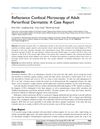3 citations,
March 2023 in “International journal of molecular sciences” Keratin protein production in cells is controlled by a complex system that changes with cell type, health, and conditions like injury or cancer.
124 citations,
January 2012 in “Journal of Allergy and Clinical Immunology” Endocannabinoids help control mast cell activity in human skin.
1 citations,
September 2021 in “Nigerian journal of medicine : journal of the National Association of Resident Doctors of Nigeria” Androgenetic alopecia is common in South-West Nigeria, affecting more men than women, with stress worsening the condition.
October 2023 in “Applied sciences” Iris germanica rhizome-derived exosomes help protect skin cells from oxidative stress and aging.
 May 2002 in “Australasian Journal of Dermatology”
May 2002 in “Australasian Journal of Dermatology” Finasteride is effective for male hair loss, teledermatology is accurate and accepted, and cyclosporin helps treat toxic epidermal necrolysis.
 January 2023 in “Integrative Journal of Medical Sciences”
January 2023 in “Integrative Journal of Medical Sciences” A young Saudi girl with uncontrolled type 1 diabetes and hypothyroidism had two rare conditions, Mauriac syndrome and Van Wyk–Grumbach syndrome.
 January 1989 in “Side effects of drugs annual”
January 1989 in “Side effects of drugs annual” Some cancer and immune system drugs can cause serious side effects, including heart, lung, nerve, and organ damage, which need careful monitoring and management.
 2 citations,
August 2017 in “British Journal of Dermatology”
2 citations,
August 2017 in “British Journal of Dermatology” Hair loss in Cronkhite-Canada syndrome may be due to an autoimmune response.
 13 citations,
July 2001 in “International Journal of Dermatology”
13 citations,
July 2001 in “International Journal of Dermatology” Inflammation and Demodex mites might contribute to hair loss, and targeting them could help treat it.
 12 citations,
July 1979 in “International Journal of Dermatology”
12 citations,
July 1979 in “International Journal of Dermatology” A patient with zinc depletion improved after zinc supplementation during parenteral nutrition.
 134 citations,
January 2019 in “American journal of clinical dermatology”
134 citations,
January 2019 in “American journal of clinical dermatology” Antibiotics can reduce acne but may lead to resistant bacteria, and understanding the skin's bacteria is important for treatment.
April 2024 in “Molecules/Molecules online/Molecules annual” The composite sponge helps heal diabetic wounds by reducing inflammation and promoting new blood vessel growth.
2 citations,
September 2011 in “InTech eBooks” The document outlines steps for moving fat from one body part to another.
 2 citations,
October 2020 in “The Journal of clinical and aesthetic dermatology”
2 citations,
October 2020 in “The Journal of clinical and aesthetic dermatology” The herbal mix (Biochanin A, Acetyl tetrapeptide-3, and Ginseng Extracts) and the 3% Minoxidil solution are equally effective in treating hair loss, but the herbal mix has fewer side effects.
 13 citations,
June 2018 in “Journal of histochemistry and cytochemistry/The journal of histochemistry and cytochemistry”
13 citations,
June 2018 in “Journal of histochemistry and cytochemistry/The journal of histochemistry and cytochemistry” Laminin-511 may contribute to psoriasis by affecting skin cell growth and survival.
June 2012 in “Expert Review of Dermatology” No established treatment effectively stops inflammation and prevents hair loss in folliculitis decalvans.
 34 citations,
November 2010 in “Development”
34 citations,
November 2010 in “Development” Activating Notch in adult skin causes T cells and neural crest cells to gather, leading to skin issues.
 July 2023 in “Clinical, cosmetic and investigational dermatology”
July 2023 in “Clinical, cosmetic and investigational dermatology” Reflectance confocal microscopy helped tell periorificial dermatitis apart from similar skin conditions.
 October 2024 in “International Journal of Molecular Sciences”
October 2024 in “International Journal of Molecular Sciences” Rosa rugosa extract promotes hair growth and could be a natural treatment for hair loss.
 26 citations,
September 2018 in “Colloids and Surfaces B: Biointerfaces”
26 citations,
September 2018 in “Colloids and Surfaces B: Biointerfaces” A new liposome treatment helps heal deep burns on mice by improving hair regrowth and reducing scarring.
 4 citations,
February 2020 in “Journal of Cosmetic Dermatology”
4 citations,
February 2020 in “Journal of Cosmetic Dermatology” Synthetic hair implants can cause severe scalp problems and removing them improves conditions; natural hair transplants are safer and more effective.
 27 citations,
July 2017 in “European Journal of Dermatology”
27 citations,
July 2017 in “European Journal of Dermatology” Certain microRNAs are linked to various skin diseases and could be used to diagnose and treat these conditions.
 9 citations,
January 2017 in “Food & Nutrition Research”
9 citations,
January 2017 in “Food & Nutrition Research” Rice bran mineral extract may help promote hair growth and prevent hair loss.
 56 citations,
September 2013 in “Experimental Dermatology”
56 citations,
September 2013 in “Experimental Dermatology” The guide explains how to study human and mouse sebaceous glands using various staining and imaging techniques, and emphasizes the need for standardized assessment methods.
 August 2024 in “Journal of Clinical Medicine”
August 2024 in “Journal of Clinical Medicine” Systemic treatments like hydroxychloroquine and cyclosporine A help with Lichen Planopilaris and Frontal Fibrosing Alopecia, but ongoing treatment is needed.
 18 citations,
July 2008 in “Current Oncology Reports”
18 citations,
July 2008 in “Current Oncology Reports” EGFR cancer drugs often cause a rash, which can lead to distress and isolation, but may also improve outcomes for some cancer patients. Current treatments for the rash are limited, but a compound called menadione shows promise.
 66 citations,
July 2007 in “Journal of Molecular Medicine”
66 citations,
July 2007 in “Journal of Molecular Medicine” Stress increases certain chemicals in the skin and nerves, which might worsen skin conditions.
 6 citations,
October 2015 in “International Journal of Women's Dermatology”
6 citations,
October 2015 in “International Journal of Women's Dermatology” Hair aging is inevitable, but using the right hair care products can help maintain hair health.
1 citations,
March 2012 in “Actas dermo-sifiliográficas/Actas dermo-sifiliográficas” Dermoscopy helps diagnose frontal fibrosing alopecia by identifying specific scalp features.
 106 citations,
July 2013 in “Advances in wound care”
106 citations,
July 2013 in “Advances in wound care” UV radiation can help sterilize wounds and promote healing but requires careful use to avoid damaging cells.





















